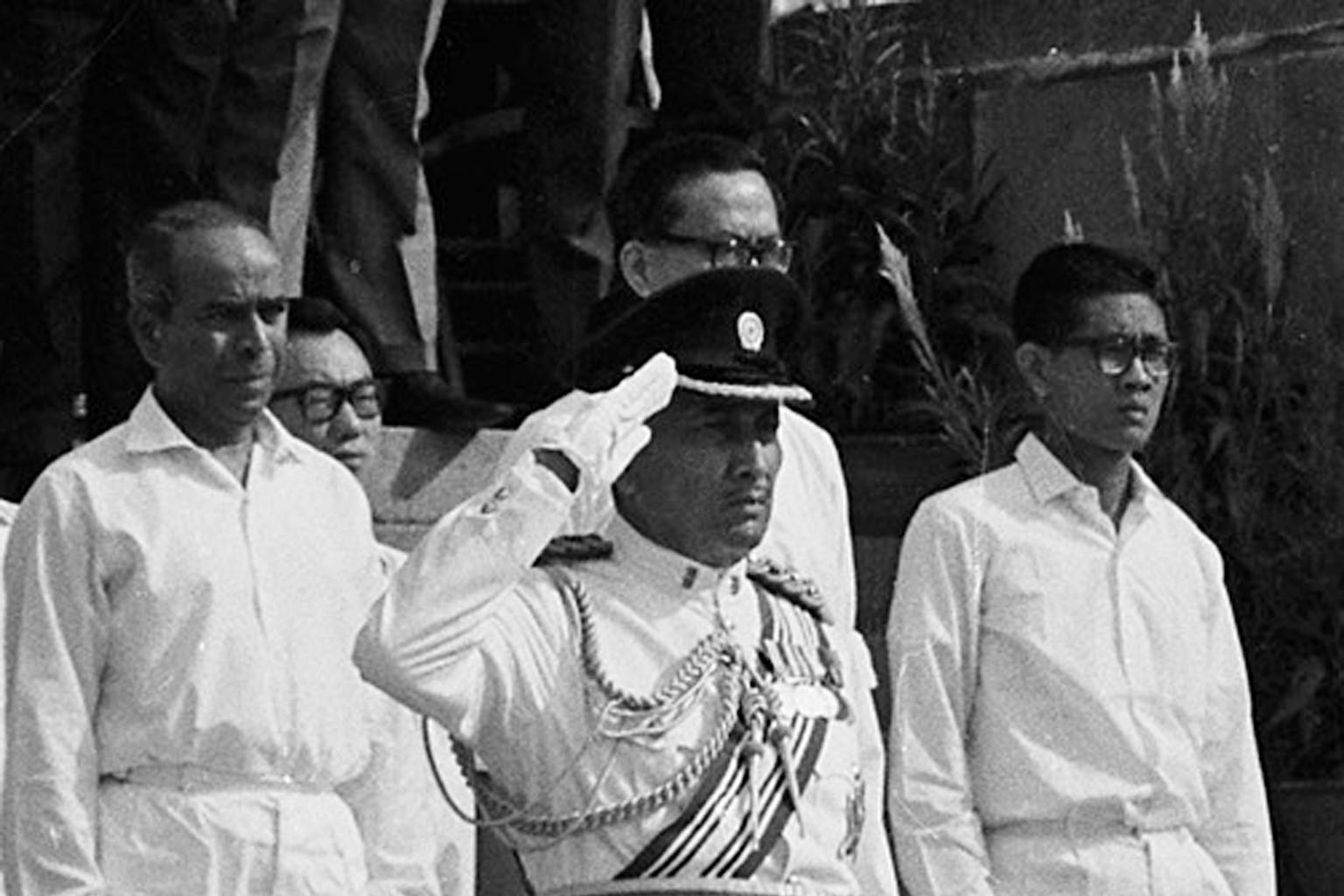PM: Keeping presidency multiracial key aim of reforms
If the president always comes from same race, the very multiracial character of nation will come under question
Sign up now: Get ST's newsletters delivered to your inbox

President Yusof Ishak, in military uniform, takes the salute at the Padang during Singapore's first National Day Parade in 1966. Mr Yusof, who died in office close to five decades ago, was Singapore's first and only Malay president so far.
ST FILE PHOTO
Follow topic:
Prime Minister Lee Hsien Loong said that among all the proposed changes to the elected presidency, the one the Government thought hardest about, and where the most is at stake, is the issue of ensuring multiracial representation in the highest office of the land.
Mr Lee disclosed this in Parliament yesterday when he sought to drive home the importance of the provision to reserve elections for certain races from time to time.
He said: "Whether to ensure that people from different races can and do indeed become president is the most difficult question, because it goes right to the core of our fundamental belief in a multiracial society."
The president, who is the symbol of the nation, represents all Singaporeans. Hence, the office must be multiracial.
"If the president... always comes from the same race, not only will he cease to be a credible symbol of our nation, but the very multiracial character of the nation will come under question," Mr Lee said.
Race is a live issue for Singapore because it is a small, open and multiracial country, he added.
Mr Lee also said that racial harmony in Singapore can be affected by developments in other countries.
He cited the rise of China, the issue of race and religion in Singapore's immediate neighbours, as well as the threat of a terror attack here.
Singapore has substantial relations with China, and their businesses and governments work closely together.
Yet, because of the make-up of Singapore's population and cultural familiarity, people may misunderstand Singapore to be a Chinese country, and forget that Singapore is, in fact, an independent sovereign country, said Mr Lee.
"We are not a Chinese country, but a multiracial, multi-religious South-east Asian country with an ethnic Chinese majority, but not a Chinese country. We have to show this," he said.
He stressed that Singapore needs to demonstrate not only to Singaporeans but also to its neighbours that it is a multiracial country.
Mr Lee also pointed to Indonesia's incumbent Jakarta governor, Mr Basuki Tjahaja Purnama - better known as Ahok - who is running for re-election.
"Ahok is a Chinese and a Christian. His opponents cited a Quranic verse to tell Muslims not to vote for Ahok. They called him a "kafir", an infidel, a strong word."
Ahok responded in a YouTube video, accusing them of lying and misinterpreting the Quran. He was attacked for blasphemy.
Despite his apology, his opponents staged a huge demonstration in Jakarta last Friday and there was violence and rioting.
In another example of how race and religion are hot issues in the region, Mr Lee cited Malaysia where politics is based on race and political Islam is a dominant feature.
Parti Islam SeMalaysia tabled a Bill in Parliament to enforce hudud law - or the Islamic penal code - which includes amputations and whipping as punishments.
The Barisan Nasional Government allowed it to be put on the Order Paper in Parliament which lists the House agenda.
"Non-Muslim parties are deeply upset about this, but they know that in such matters, they do not decide. The divide between the races is very deep," said Mr Lee.
Singapore is not like any of the countries cited, he said. "We are building a radically different society in Singapore."
It seeks to be multiracial, equal and harmonious, allowing minority communities ample space to live their own way of life, he said.
But this will not happen without hard work, or by ignoring the realities of race in Singapore.
Said Mr Lee: "We have to work consciously and systematically at this. It will not happen by itself, nor will we get there if we blithely assume that we have already arrived and do not talk about it."
Surveys show that at least a significant minority of Singaporeans consider race a factor when they vote, which means minority candidates are at a disadvantage in an election, he said.
Practical arrangements must therefore be made to make Singapore's multiracial system work, he said, hence the proposal of periodic reserved elections.
Still, Singapore's ideal is to be race-blind.
And as Singapore gets closer to the ideal, and minority candidates are regularly elected as president in open elections, these reserved elections will be needed less and less, said Mr Lee.
VIDEO
PM Lee says the next presidential election is reserved for Malay candidates. http://str.sg/4ggW

